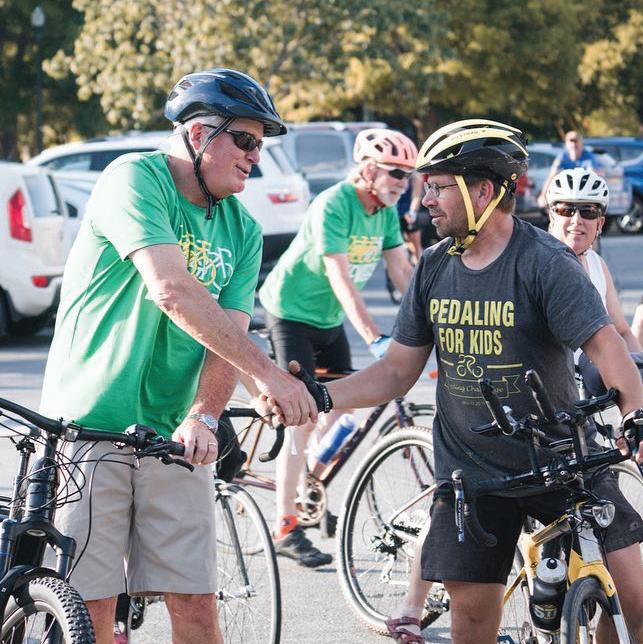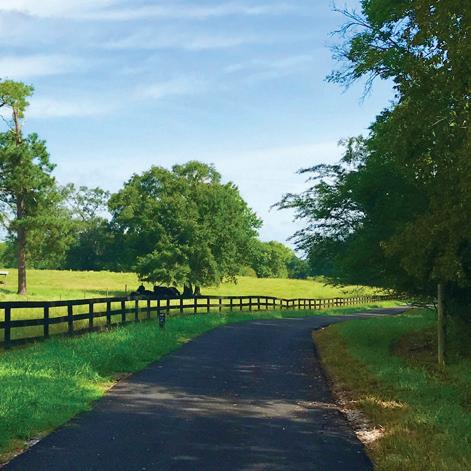
4 minute read
Downtown Developments: Outdoor Recreation Drives Local Economies
OUTDOOR RECREATION DRIVES LOCAL ECONOMIES
BY GEORGE DUSENBURY, DECATUR COUNCILMEMBER AND VICE PRESIDENT SOUTHERN REGION/GEORGIA STATE DIRECTOR, TRUST FOR PUBLIC LAND.
Advertisement
IN AN ERA OF DIVISION AND PARTISANSHIP, it is remarkable that just four years ago, 83 percent of voters checked YES for the Georgia Outdoor Stewardship Amendment (GOSA), dedicating existing sales tax collected on outdoor recreation products to create parks, build trails, and protect land and water. That outcome overwhelmingly illustrates that people love the outdoors and want our governments to preserve land and build recreational amenities for hiking, biking, fi shing, birding, paddling, climbing and other outdoor activities.
The good news is that investing in the outdoors makes economic sense. As noted in the 2022-2026 Georgia State Comprehensive Outdoor Recreation Plan (SCORP):
Outdoor recreation is one of the strongest economic forces on Georgia’s economy with 238,000 directly related jobs, $27.3 billion in consumer spending and $12.4 billion in value added greenspaces according to the 2019 reports of the Bureau of Economic Analysis and the Outdoor Industry Association. With overwhelming data like this, it is not hard to see that Georgia’s natural resources and outdoor recreation mean big business and jobs for Georgians, bringing great prosperity to our communities in urban, suburban, and rural settings.
The expansive world around outdoor recreation is not just impactful for jobs and business, it also infl uences where people want to live and residential valuations. According to a 2019 survey from the National Recreation and Park Association, 85% of respondents stated that they seek high-quality recreation areas and programs when choosing where to live.
Local governments across the state are responding and embracing outdoor recreation as a tool to improve the quality of life and create economic opportunity by

attracting new residents, businesses and tourists. Here are just a few examples: • Columbus has reoriented toward the Chattahoochee River, creating a two-mile whitewater raft ing run and 1,200-foot-long zip line across the river estimated to attract 60,000 to 100,000 visitors annually with an economic impact of $4 to $7 million. The city also has invested in several bike trails and boasts great mountain biking at Standing Boy State Park. • In 2019, Rome, Floyd County and the private sector created the Rome-Floyd Greenway Partnership to better connect neighborhoods, college communities and commercial districts with its growing trail network. • The Riverwalk in Augusta is a Serene 18 Paddle Trail and Phinizy Swamp, where you can bike, hike, experience wildlife, enjoy excellent bird watching and more. • Waycross, like other park gateway towns across the state, benefi ts from the more than 500,000 people who visit the Okefenokee National Wildlife Refuge annually, generating roughly $88 million in economic impact in Charlton, Clinch and
Ware counties.
While these towns have benefi ted from their embrace of the outdoors, tremendous opportunity remains untapped. Our neighbor to the north, Chattanooga, established the innovative “Outdoor Chattanooga,” a division of the city’s Parks and Outdoors Department in 2004. Its mission is to make outdoor recreation an attractive, healthy, and distinguishing lifestyle for Chattanooga’s residents and visitors, which, in turn, will maintain and enhance the value of the region’s resources, and help grow the region’s economy. Outdoor Chattanooga has gotten results, with Outside Magazine twice naming Chattanooga the “best town ever” and the Wall Street Journal identifying it as one of the best places to retire.
Inspired by the success of cities like Chattanooga;
Asheville, North Carolina; and elsewhere, the Georgia Outdoor Recreation Coalition is advocating for the creation of a statewide Offi ce of the Outdoors to help Georgia better leverage its outdoor recreation amenities to compete with states like North Carolina and Tennessee for residents, businesses, tourists and the economic opportunity that they provide. Sixteen states, including North Carolina, already have created offi ces of outdoor recreation. Earlier this year, state Sen. Sheikh Rahman, D-Duluth, and a bipartisan coalition of 28 senators introduced legislation to create a Georgia Offi ce of the Outdoors. While the bill did not pass this year, it has created interest and momentum in the eff ort. We expect the senators to renew their eff ort when the General Assembly convenes next year.
The Georgia Municipal Association has been a wonderful ally in our eff ort to advocate for parks and outdoor recreation as a way to catalyze economic development and improve the quality of life for all Georgians. City leaders recognize that the physical and emotional health of residents and economic growth depend on our ability to fi nd creative approaches that embrace and protect natural resources while providing signifi cant benefi t to communities.
I invite you to get involved in the Outdoor Recreation Coalition and join our eff ort to create a Georgia Offi ce of the Outdoors. When we come outside together, under the sun and sky and on the lands and waters that support us all, we can fi nd common ground and shared opportunity. We are moving fast – because the intersection of opportunity and need that exists today off ers unique and exciting potential.



